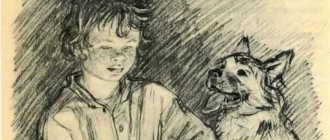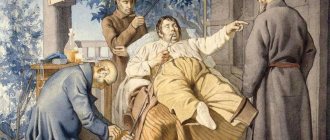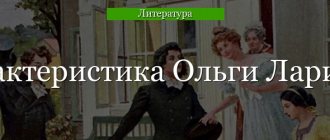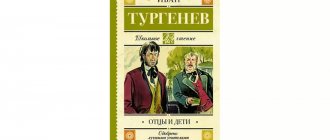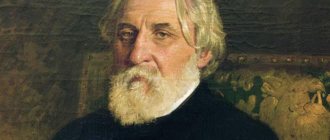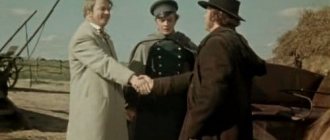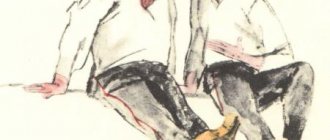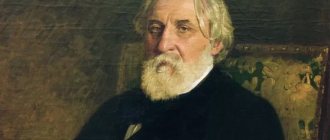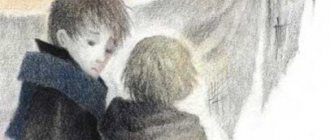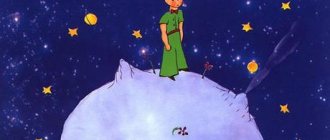- Essays
- On literature
- Turgenev
- Khor and Kalinich comparative characteristics
In the series “Notes of a Hunter” by Ivan Sergeevich Turgenev, a special place is occupied by the story of friendship “Khor and Kalinich”. This story first appeared in the Sovremennik magazine and it is safe to say that it changed the opinion of the average resident of the Russian Empire about the peasants. In those days, it was believed that the main goal of peasant life was to please the landowners. No one thought that they knew how to admire, rejoice and be sad, and most importantly, be strong friends. The story refuted these opinions, showing one of the corners of vast Russia, along with its traditions, spiritual values and moral principles. The author of the story showed the reader two completely different people, who did not at all interfere with being good friends.
The ferret in the story is shown as a very businesslike and self-sufficient person. In the modern world, he would probably become an entrepreneur-businessman. He was engaged in trade, was completely independent of the master, but always paid the rent and at the same time communicated very well with him. He had a big family, a lot of sons who wanted to become like their father, and a big house.
Very often the author mentions the hero’s extraordinary intelligence and ingenuity and compares him with Peter the Great and Socrates. The peasant knows that the further he lives from the master’s eyes, the easier it is, so he settled in the swamp. He is very insightful: he understands perfectly well that literacy would be useful for his children in life, but at the same time he knows that those who are literate will be taken to the master’s yard, so he does not teach his children. Khor was silent more than he spoke, but he always said only the essence. He was also interested in public and government affairs.
The author never calls the hero by name. Ferret is his nickname. Khor is already quite an old man - bald and short, thick-set and broad-shouldered.
Kalinich is an aged peasant, but unlike Khor, he is tall and thin. He has blue eyes and a small wedge-shaped beard. The hero is good-natured and almost always smiles. If Khor lives in a swamp, then Kalinich lives in the depths of the forest, where he has his own apiary. He has a small hut and, unlike Khor, he has no family and a small farm, but he loves all living things. He can speak out of fear and rage, and his bees do not die, because “his hand is light.”
Kalinich spent all his time either in the apiary or hunting. Khor is a realist and rationalist, and Kalinich is a dreamer and idealist. He believes in everything that he is told and does not really like to think about the meaning of existence. According to Polutykin, he is a “kind man,” and Khor loves him and acts as a patron in this tandem.
These two people were completely different, their characters were completely opposite, but this was precisely the main advantage of their friendship. They complemented each other perfectly and never conflicted.
These heroes are the embodiment of the broad Russian soul and strong friendship. This is shown especially clearly at the end of the story, where two people, so different from each other, sing together one song that reveals the soul of simple Russian peasants.
Other works: ← The image and characterization of Arkady Kirsanov in the novel Fathers and Sons↑ TurgenevGerasim and Tatyana in Turgenev’s story Mumu →
The way of Russian life
Khor and Kalinich are the main characters of the story; Turgenev’s main interest is focused on their characters.
Serfs, dependent people did not turn into obedient slaves: spiritual wealth and freedom distinguish them from the landowner Polutykin. The living and integral image of folk Russia is reflected in the characteristics of Khor and Kalinich. Analysis of “Khor and Kalinich” allows us to assert that the main characters are like two poles:
Turgenev narrates about his heroes from the point of view of a hunter. The presence of the narrator does not embarrass anyone; he is able to find a common language with representatives of any social groups, and this allows you to look into the intimate corners of the heroes’ souls. The hunter’s habit of talking about the life and character of the area in which he is located, which is characteristic of the essay genre, about other people, and comparing them with the characters helps to reveal their characters.
Minor characters
Arina Timofeevna
The miller's wife, a typical victim of the master's tyranny. Being a pretty, modest and helpful maid, she was in good standing with her mistress. But, having the “chutzpah” to fall in love with the lackey Peter, she fell into terrible disgrace. For her criminal relationship with a newborn child, Arina was sent to the village, and her lover Petrusha was exiled to serve as a soldier.
Matryona
A beautiful serf girl with whom a young landowner fell passionately in love. However, these feelings became a real test for Matryona. Yielding to the entreaties of the loving landowner, Matryona runs away from her mistress, but does not find happiness and peace in her personal life. As a result, she returns to the lady in order to thereby protect her lover from prosecution.
Morgach
The master's coachman, who was incredibly lucky: having become a clerk, he not only received his freedom, but also became quite rich. A man of his own mind, who was not distinguished by either a good disposition or excessive anger. His family is quite small: Morgach himself and his son, a complete copy of his father.
Clever peasant
Khor is a serf peasant of the landowner Polutykin, who characterizes him as a smart man. The writer masterfully creates the image of a peasant thinker. A short, strong, fifty-year-old man with an attentive gaze, firmly standing on the ground. He has a large family: nine sons, daughters-in-law, and a grumpy wife. He is a real master and behaves with dignity. A strong economy and prosperity are earned through one’s own labor. When studying a quotation portrait of a hero, a figurative “picture” is created in the reader’s head for a complete acquaintance with him:
He lives in an atmosphere of isolation: his estate is located in the middle of the forest, separate from the rest of the serfs.
Good man
Kalinich’s characterization is completely opposite. Khor and Kalinich are different in both appearance and character. Using several quotes from the work, you can create a vivid and imaginative portrait of the hero:
Characterizing this hero, Turgenev merges him with nature: knowledge of many herbs makes him a good healer, he loves and breeds bees, he is attracted to the forest and spends every day hunting. Kalinich, with its homelessness and soulful melodiousness, is akin to the expanses of the steppe, short and wonderful evenings.
Turgenev shows heroes, different in character and worldview, but identical in relation to moral standards, in the story “Khor and Kalinich”. Based on the characteristics of the heroes, one can notice that despite their opposition, they complement each other and harmoniously unite into one generalized whole called “Russian people” . Their portrait description can be combined into a figurative “table”, showing the businesslike and practical Khor and the poetic, sincere, soft Kalinich.
In his essay, the author admires the business qualities and diverse talents of the Russian people, recognizing the people as the masters of their native land. Khor and Kalinich are one of the best heroes in the “Notes of a Hunter” cycle; they show a spiritual relationship with each other and a relationship with nature .
Source
Characteristics of Khor in the story “Khor and Kalinich”, image, description
| Khor and Kalinich. Artist P. P. Sokolov |
The peasant Khor is one of the central characters in the story “Khor and Kalinich” by Turgenev.
This article presents the quotation image and characterization of Khor in the story “Khor and Kalinich” by Turgenev: a description of the hero in quotes.
See:
- All materials on the story “Khor and Kalinich”
Characteristics of Khor in the story “Khor and Kalinich”, image, description
Khor is a serf peasant of the landowner Polutykin, living in the Zhizdra district of the Kaluga province.
“So he settled in the swamp. From then on he was nicknamed Khorem.”
“On the threshold of the hut, an old man met me - bald, short, broad-shouldered and stocky - Khor himself. I looked at this Khor with curiosity. The shape of his face was reminiscent of Socrates: the same high, knobby forehead, the same small eyes, the same snub nose.”
". calmly stroking his curly beard. "
". The ferret burst into laughter, and his small eyes completely disappeared.”
". Khor raised his leg and showed Kalinich a boot, probably made from mammoth skin.”
". Why does Khor live separately from your other men?”
“Twenty-five years ago his hut burned down; So he came to my late father and said: they say, let me, Nikolai Kuzmich, settle in your swamp in the forest. I will pay you a good rent."
“Around the cart stood about six young giants, very similar to each other and to Fedya. “All children of Khorya!” - Polutykin noted. “It’s all Ferrets,” said Fedya, who followed us out onto the porch, “and not all: Potap is in the forest, and Sidor has gone to the city with old Horem. "
“We were met by a young guy, about twenty, tall and handsome.” (about Fedya)
“A boy of about fifteen, curly and red-cheeked. “(about Vasya) “There’s one, he’s old, he won’t marry,” he answered, pointing to Fedya, who was still leaning against the door. “Vaska, he’s still young, he can wait.”
“The polecat bred a large family, obedient and unanimous. "
- Got rich. Now he’s paying me a hundred rubles in quitrent, and I’ll probably throw in some extra.”
“What, you’re also involved in trade? - I asked him.
— We trade little by little in oil and tar. "
“I’ve told him more than once: “Pay off, Khor, hey, pay off. “And he, the beast, assures me that there is nothing; there is no money, they say. Yes, no matter how it is. "
“Why should I pay off? Now I know my master and I know my rent. Our master is good."
“Oh, you know, Khor will get right into the merchants; Merchants have a good life, and even those have beards.”
“While talking with Khorem, for the first time I heard the simple, intelligent speech of a Russian peasant. His knowledge was quite extensive, in its own way, but he could not read. "
“Have you taught your children to read and write?” Khor was silent. “Fedya knows.” - “What about others?” - “Others don’t know.”
“He seemed to feel his dignity, spoke and moved slowly, and occasionally chuckled from under his long mustache.”
“But at other times there was no more active person than him: he was always tinkering with something - repairing a cart, propping up a fence, revising harnesses.”
“Khor was a positive, practical person, an administrative head, a rationalist. "
“Khor understood reality, that is, he settled down, saved up some money, got along with the master and other authorities. "
“Kalinich did not like to reason and believed everything blindly; Khor even elevated himself to an ironic point of view on life.”
“He saw a lot, he knew a lot, and I learned a lot from him.”
“Khor was silent, frowned his thick eyebrows and only occasionally noticed. "
". I thought to myself. "(that is, I thought with my own head)
“Kalinich stood closer to nature; The ferret is for people, for society. "
“However, as smart as he was, there were many prejudices and prejudices behind him. For example, he despised women from the depths of his soul, but in a merry hour he amused himself and mocked them.”
“He, however, did not adhere to particular cleanliness and once answered my comments that “the hut needs to smell like housing.”
". Kalinich entered the hut with a bunch of wild strawberries in his hands, which he picked for his friend, Khor. The old man greeted him cordially. I looked at Kalinich in amazement: I admit, I did not expect such “tenderness” from the man.”
“The two friends were not at all alike.”
“Khor loved Kalinich and provided him with protection; Kalinich loved and respected Khor.”
“Kalinich sang quite pleasantly and played the balalaika. The ferret listened, listened to him, suddenly bent his head to the side and began to pull him up in a plaintive voice. He especially loved the song: “You are my share, share!” Fedya never missed an opportunity to make fun of his father. “Why, old man, are you so upset?” But Khor rested his cheek with his hand, closed his eyes and continued to complain about his lot. "
This is the quotation image and characterization of Khor in the story “Khor and Kalinich” by Turgenev: a description of the appearance and character of the hero in quotes.
Characteristics of the story
The author's thoughts about the “difference between the breed of people” in Russian provinces are narrated. The work is complemented by a detailed depiction of their life, activities and external disagreements.
Image of the main characters
From general judgments of a short story, the writer approaches a detailed description of the human “breed”.
The main characters: Khor and Kalinich are simple peasants, real people, through whom Turgenev gives the reader the opportunity to better understand not only the appearance, but also the character of a person of those times.
The narrator wrote the story “Khor and Kalinich” in the genre of realism. The first hero from the common people is Khor - an old man of small stature, broad-shouldered and dense. External resemblances and facial features resemble the portrait characteristics of Socrates: a high forehead, small, beady eyes and a snub nose.
The described quitrent peasant, who was nicknamed by this name, is not eager for freedom, everything suits him. It seems that he has his own mind. He answers questions reluctantly, but expresses interest in his interlocutors. In life he is a positive person, a rationalist by nature.
Khor lives in the Zhizdra district of the Kaluga province and is a serf peasant of the landowner Polutykin. The hero’s true name is not indicated: “So he settled in the swamp. From then on he was nicknamed Khorem.” Because 25 years ago, the main character’s house burned down, and he asked to settle in a swamp in the forest, in return promising to pay the landowner a good rent. The head of the family has a wife and ten sons, nine of whom are married.
Activities of Khorya:
- Trades in oil and tar.
- He does housework.
He has enough money, but he is in no hurry to separate to an independent life without rent. According to the master, he is an intelligent but illiterate man, he respects himself for turning from a poor peasant into a wealthy merchant.
Kalinich is a forty-year-old man , lean and tall in build. In life, he is an idealist and romantic, often dreams and “flies in the clouds.” According to the story, he had a personal apiary, and he helped the master in the hunt. The latter acts as a narrator and narrates the work.
The reader is confronted with the image of a Russian gentleman - the small landowner Polutykin. This character evokes direct sympathy, but does not have the qualities that attract a researcher of human souls. The author does not directly characterize the responsibility and spontaneity of the landowner, but the text contains examples that confirm this.
With a few strokes, the author of a single chapter captured the nature and landscape surrounding the main characters, noting “what kind of game attracts an avid hunter.”
Comparison of two peasants
The creation of the work is also aimed at comparing the two heroes, their morals and outlook on life.
The description of the appearance, as well as the character of Turgenev’s heroes Khor and Kalinich, are revealed in quotes from the text.
Comparison table
| Polecat | Kalinich |
| An active, hardworking person, takes care of his own household, and can understand reality. | Very kind and flexible |
| Seen a lot of life, knows a lot | Lives in seclusion |
| Taciturn, silent, only “strong-tongued” when it comes to business | He doesn't like to reason and believes everything. |
| Located closer to nature. | He spoke blood, fear, rabies, drove out worms, kept an apiary and was not afraid of bees. |
| Doesn't care about cleanliness | Hardworking, neat |
| Finds contact with both the master and the “rest of the authorities” | He worships the master, walks in bast shoes, is content with small crumbs |
| Disdainful of women | Afraid of his wife |
| Couldn't read | Was literate |
Khor is friends with Kalinich. Being complete opposites, friends appreciate each other, value their friendship and spend time together.
When the gentleman strives for pretentiousness and originality, his serf Khor strives to be closer to nature. The peasant's estate is located in the middle of the forest; in the house, “not a single Suzdal painting” disfigures the untouched beauty of the log walls. Guests eat simple and hearty food, washed down with drinks.
The sons of Khor are presented in the images of “young giants”, reminiscent of Russian heroes. Polutykin talks about his subordinate as a “sensible man.”
Natural intelligence, business acumen, quick wit, ability to understand people—these character traits attract the narrator.
Initially, it seems that Kalinich is another serf of the landowner; he does not look like a wealthy peasant. The difference between the two friends lies not only in their appearance, but also in their everyday life, occupation and manner of behavior.
Khorya's temperament:
- Rationalist.
- Philosopher.
The smart and perspicacious Khor makes fun of his friend, reproaching him for his blind obedience to the landowner, but does not put himself above Kalinich.
Their friendship is based on deep inner kinship and mutual sympathy. They complement each other so harmoniously that their inseparable and indestructible connection arises.
The spiritual unity of two people merges by singing together to the balalaika.
Kalinich's character:
- An enthusiastic romantic.
- Materialist.
The living and open soul of the Russian person is sensitive to musical notes; the simple words of a folk song can touch the romantic Kalinich and the rationalist of his friend.
Differences and disagreements are provoked by human individuality, the convergence of the Russian spirit.
The comparative characteristics of Khor and Kalinich in the table confirm that, despite the differences in the characters of each hero, they are still friends and have a great time.
Prototypes of the characters in the essay
As is known from the plot of the story, a certain landowner of the Kaluga province, Mr. Polutykin, met the author of the story on the basis of a mutual passion for hunting. The heroes of the story “Khor and Kalinich” are real. In fact, the hospitable owner of the hunting grounds was called Nikolai Aleksandrovich Golofeev. Ivan Sergeevich actually met him while hunting and stayed with him for several days. Moreover, having read Turgenev’s story and recognizing himself in it, Mr. Golofeev became angry with Ivan Sergeevich.
The image of the wealthy serf Khor, a strong owner, an educated man, is real down to the smallest detail. The current village of Khorevka, Ulyanovsk district, Kaluga region, has grown from the former farm of Khorya. Years later, Afanasy Afanasyevich Fet visited Khor, an eighty-year-old owner who “doesn’t care about years.” The owner of the farm always proudly showed Turgenev’s work to guests. He, of course, knew its summary by heart. “Khor and Kalinich” thus reflects real people and real facts.
Review of the work
The summary of “Khorya and Kalinich” describes the main plot of the work. The appearance of the main characters coincides with their inner world.
Narration and key idea of the author
At the very beginning of the text, the narrator makes it clear that he observes a big difference between the people of the Oryol province and the Kaluga settlers. Oryol men are short, stoop, often frown, live in aspen buildings and wear bast shoes.
Residents of the Kaluga province are tall, distinguished by their enthusiasm, wear boots and live in pine huts, but can live in forests.
According to the story, the master comes to Zhizdrinsky district and meets with the small landowner Polutykin. From the description it is clear that he is an avid hunter and a respectable person by nature. The landowner quickly invites the narrator home, but first invites him to visit his peasant, Khorya. The estate was located in a forest clearing, in a remote place. In appearance, the house resembled the home of a lone wolf. Khorya's son Fyodor greeted the guests, and later nine others arrived.
Half an hour later they got ready to have dinner at Polutykin’s house. The landowner talked about Khor, why he lives separately from the others. The main reason for solitude and seclusion was the fire of his own house, but the man was not afraid and created his own farm from scratch. More than 25 years ago, Khor’s home and buildings burned down, and he came to the landowner to ask to build a house in a swampy place. The theme of the quitrent was a promise of gratitude. A year later, the peasant’s life and life improved. When the landowner offered to pay off, Khor declared that he had no funds.
When gathering according to plan, another person joined the hunt - Kalinich. He carried the landowner's gun, followed it everywhere and carried out errands. The day was hot, and Kalinich suggested going to his apiary. The guests tasted honey and washed it down with kvass.
When Khor learned that the narrator was abroad, he was interested in government affairs, about the structure, and customs of foreign people. Kalinich was interested in solitude with natural nature and descriptions of large cities.
On the evening of the fourth day the narrator had to go home.
Friendship between Khor and Kalinich
Khor is a calm, reasonable family man. But he has no servants. The big, friendly Khorya family: six sons, as powerful as their father, build tall, spacious huts, run the household, and help each other. Once upon a time, the landowner Polutykin allowed him to leave the rural community, establishing a quitrent of 50 rubles. Khor, who founded his farm, developed his economic activities in such a way that he considered it fair to pay the landowner 100 rubles. If he wanted, he could pay off and become free, but he doesn’t want this. For what? His elements are earth and labor, and so they are always with him. He is by nature a rationalist, a business executive. Khor is well oriented socially and legally.
This strong owner, ironically, has Kalinich, who, oddly enough, is completely opposite to him. The latter lives as a bob. Kalinich does not know how to run a household, earn and save money. However, it has other advantages. He understands animals, knows how to handle bees, and has them, which he uses for treatment. Khor and Kalinich are completely different people. The summary of the story, however, testifies to their close friendship. The practical and reasonable Khor, thanks to Kalinich, receives, if necessary, help in handling domestic animals, treatment with traditional medicine, and Kalinich receives support from Khor on everyday issues, where he is a layman. In addition, both of them are interesting conversationalists. Turgenev wrote in the story that he left their company with great reluctance.
Main characters
Narrator
The author, who is also the narrator, is a landowner and an avid hunter. Wandering around central Russia with a gun and a faithful dog, he communicates not only with large and small landowners, but also with ordinary surrounding peasants. The author has a gentle, modest, and benevolent disposition. He is sensitive to the beauty of nature, and with much greater pleasure spends time in the forest or in the field than at dinner parties.
Polecat
A quitrent peasant, a strong and strong man of advanced years, incredibly hardworking. That is why his entire family lives in prosperity, with an established economy. Illiterate, but possessing extensive knowledge, expresses his thoughts sparingly, importantly, with caution. The ferret is very observant, perspicacious and is able to give an accurate description of each person. This is a realist to the core, personifying the irrepressible energy, activity and perseverance of the Russian peasant.
Kalinich
Khor's close friend is an easy-going, good-natured person with a cheerful, gentle disposition. He does not have a family, and he does not seek to start one. This is a person of a completely different type: a born dreamer, idealist, romantic, capable of a very subtle sense of nature. Kalinich is not distinguished by prudence and thriftiness, he is very trusting.
Ermolai
The serf peasant is a good-for-nothing slacker to whom his landowner forgives everything because of his amazing ability for fishing and hunting. Ermolai is not averse to a drink and a heart-to-heart talk, he is impatient and good-natured. Despite the fact that he is married, he does not devote time to either his wife, or his dilapidated house, or the household. He is not respected among the servants and is considered an eccentric who always gets into various troubles.
Biryuk
A stern, responsible forester who regularly performs his duty. He had to endure a terrible betrayal: his beloved wife ran away with another man, leaving him with two children to care for. Despite the outward gloom, he is distinguished by a kind heart, responsiveness and mercy. We can say that Biryuk is the personification of severe duty.
Heroes of Ivan Turgenev's story “Khor and Kalinich”
In 1847, a very interesting essay was published in the then-famous magazine Sovremennik, which was called “Khor and Kalinich.” For some reason, the publishers, and even its author, Turgenev, did not really believe in success. However, they were wrong; immediately after the publication of the magazine, this little story amazed readers. It was a wonderful success. Inspired by this, Turgenev began to publish similar short stories, which the reader really liked. In 1852, a separate book was published - a collection of similar small essays, “Notes of a Hunter.”
The main characters of “Khor and Kalinich”, in fact, are Khor and Kalinich - they are serfs with completely opposite characters. Most likely, Turgenev wanted to show how people fought against bondage in different ways.
Khor is a prudent and practical person. He settled in a swamp, where, supposedly, the land was not suitable for sowing. At the same time, he is an ordinary serf, he was able to save decent money, build an excellent house, and have children. He is a silent person and does not like to chat in vain. He had a pretty good relationship with his master. He never wasted time just like that, Khor was always busy with work and never sat still. He either repaired the cart, then revised the harness, or repaired the fence. He was a very educated man, he understood and understood a lot of things, although he could not read at all.
Kalinich is the complete opposite of his close comrade. He was a dreamy, romantic person, he was always somewhere far from reality, “flying in the clouds.” He lived, to put it mildly, meagerly, walking around in bast shoes. He once also had a wife, but he was very afraid of her, he never had children at all. He always bowed down to the master and tried to please him in everything. Unlike Khor, Kalinich did not like administrative matters; he liked reading descriptions of mountains and nature more. He lived in a low hut, his owner was a bad one. But, according to Khor, he had a “light hand.” Kalinich knew how to sing well and play the balalaika.
It was only music that united these two such different people. They both really loved the song called “Share, you are mine, Share.” As soon as Kalinich began to play, Khor immediately began to sing along with him in a plaintive voice. It is here that Turgenev openly declares the talent of the Russian people.
The story “Khor and Kalinich” reveals to the reader the life of different peasants under serfdom. At the same moment, they show that Russian people have always, at any time, been and will be talented.
The story “Khor and Kalinich” on the Top books website
In portraiture, Turgenev partly echoes Gogol. Portraits in Turgenev's novels are different. Firstly, it is a detailed portrait with a precise description of individual external characteristics, designed mainly for visual impression and accompanied by small comments. The hero or heroine whom Turgenev portrays satirically usually appears, as in Gogol, when the appropriate background has already been drawn and the reader has formed a certain […]
The story “Khor and Kalinich” begins the series “Notes of a Hunter.” This essay was published in the updated Sovremennik magazine, and with its publication Turgenev made a revolution in the artistic solution to the theme of the people. “Khor and Kalinich” turned out to be the poetic core of the anti-serfdom book. That is why I chose this story for analysis. In two peasant characters, Turgenev presented the fundamental forces of the nation that determine its viability, the prospects for their further growth and formation. But further growth and formation
It is impossible if serfdom exists, which has a detrimental effect not only on peasants, but also on nobles. Turgenev shows that this is a national evil. This problem is raised not only in “The Chorus and Kalinich”, but also in all other stories. The ferret is one of the main characters of the story. He is a positive, practical person, an administrative head, a rationalist. Having settled in the swamp, Khor managed to get rich. He settled down, “accumulated some money,” got along with the master and other authorities, raised a large family, obedient and unanimous. Khor spoke little, chuckled to himself, he saw right through his master. Khor stood closer to people, to society, he was occupied with administrative and state issues. His knowledge was quite extensive, in its own way, but he could not read. Khor could not live without work, he was constantly doing something: either repairing a cart, propping up a fence, or revising harnesses. He lived in an estate that rose in the middle of the forest, in a cleared and developed clearing. This is how Khor appears before us. Kalinich is also the main character of the story, but he is not at all like his friend Khor. Kalinich was one of the idealists, romantics, enthusiastic and dreamy people. He walked in bast shoes and managed to get by somehow. He once had a wife, whom he was afraid of, but had no children: Kalinich, unlike Khor, was in awe of his master, explained himself passionately, “although he did not sing like a nightingale, like a lively factory man.” Kalinich was gifted with such advantages that Khor himself recognized: “he charmed blood, fear, rabies, driving out worms; the bees were given to him, his hand was light.” Kalinich stood closer to nature, he was more touched by the descriptions of mountains and waterfalls than by administrative and government issues. He lived in a low hut and could not support the farm. He could read, sang well and played the balalaika. Only Khor and Kalinich liked music; it united them. Khor really loved the song “Share, you are mine, share!” and Kalinich knew this well. As soon as he starts playing, Khor begins to chime in with a plaintive voice. Here the theme of the musical talent of the Russian people manifests itself for the first time. This is how Kalinich appears before us. The story “Khor and Kalinich” in the series “Notes of a Hunter” reveals the inner strengths of Russian people, the prospects for their further growth and development, reveals their giftedness, talent, and their high spiritual qualities. Turgenev leads the reader to the idea that all “living Russia, not only peasants, but also nobles, should take part in the fight against the national enemy.
Essays on topics:
Khor's views on Russian society
The educated worker Khor refutes the views of the “experts of the people,” the Slavophiles, who extol pre-Petrine Rus' and talk about the patriarchal nature of the Russian peasantry. The competent farm owner enters into a debate with them. He believes that Peter I, in his reforms, acted exactly as a real Russian man should have acted. The essay included this lively popular view, as evidenced by the summary. “Khor and Kalinich,” through the mouth of this real “owner of the land,” says that if a peasant needs to change something, he, seeing the practical benefits of it, is not afraid to make changes.
Conclusion
What should you note after reading this summary? “Khor and Kalinich” is a story written at the right time and place. It caused great public outcry and controversy. Belinsky, Herzen, and Annenkov were delighted with the work. However, the story was not accepted by the Slavophiles, the Aksakov brothers. But the reaction of the censor E. Volkov is especially indicative, who saw a “harmful idea for the peasantry”, claiming that in freedom he could be better than even the landowner.
One of the best literary works of I.S. Turgenev is a cycle of stories or essays (experts have not yet decided on the genre of the works included in it) “Notes of a Hunter”. In them, the writer touches on important issues relating to the life of peasants and serfdom. Ivan Sergeevich was known for his liberal views, so it is not surprising that he decided to make ordinary people the main characters of his works. Below is an analysis of “Khor and Kalinich”.
In the first of the essays in the collection “Notes of a Hunter” - “Khor and Kalinich” - Turgenev outlined two main types of the Russian peasantry, which are repeated in various forms, in different combinations of their features.
Khor is, as it were, the personification of Russian efficiency, savvy, a practical man, a sober worker, caring about the well-being of himself and his family, always fussing, like an ant, about the order and prosperity of his home. He is honest and conscientious, but his soul does not hurt for all those who suffer, he is concerned only with his own affairs; in the same way, he is little touched by the beauty of nature and the sublime motives of man.
Khor and Kalinich. Summary Audiobook
Kalinich is the complete opposite of Khor, he is a man from a different world than Khor. Kalinich is distinguished precisely by the absence of any practicality and concern for his well-being. For him, the voice of internal needs is stronger than external needs; he obeys the call of his dreamy poetic soul, which cannot endure a dry, businesslike, selfish life, filled with calculations and worries only about bread. Therefore, Kalinich, prompted by the need for spiritual freedom and poetic impressions, goes into the fields and forests and spends his life in some kind of religious contemplation of the world.
This is the main difference between Khor and Kalinich: Khor is a man of reason and action; Kalinich is a man of feeling and poetic contemplation. This determines the difference in their entire way of life.
Illustration for the story by I. S. Turgenev “Khor and Kalinich”
The ferret is highly adapted to the struggle of life, to hard work, to patience in the inconspicuous work of an ant. He is sensitive, he is perceptive and knows how to deal with people; he gets along with the master and knows how to maintain order in his own hut, in which he has a full cup. He is strict with his family, but fair. This is, in the full sense, the “master”, the head of the family, the builder of its well-being and its entire way of life, invariably guarding this order and combining good nature with severity. He personifies that Rus', which bore the centuries-old hard work of working life, distinguished by steadfastness in this work and natural common sense. These are “secular workers,” in contrast to those religiously minded natures of whom Rus' knows thousands in its midst and of which Kalinich is the personification.
Kalinichs in ancient Rus' went to “pray for peace” in the forests and deserts, surrendering to the call of religious attraction and despising the benefits and advantages of the world. Like them, Kalinich in Turgenev’s story is alien to self-interest, egoism and the slightest thirst for acquisitions. He has abandoned his home, his affairs, he enthusiastically wanders through the forest and across the field, admiring the beauty of the world, feeling the mysterious harmony in everything around him. He, as it were, fulfills the gospel covenant: “Seek first the Kingdom of God... Live like the birds of the air...” He lives like the bird of the air. His soul is kind and meek.
Publication history
The analysis of the story “Khor and Kalinich” should begin with the fact that it is the most famous of the entire cycle. This story opens “Notes of a Hunter”; it was published in 1847 in the magazine “Contemporary”. “Khor and Kalinich” was posted on a page with advertisements for the sale of agricultural items.
The writer compared the life of peasants in the Oryol and Kaluga provinces. The author paid great attention not only to how ordinary people live, but he was interested in the personality of these people. The writer's favorable attitude towards the peasants, a detailed examination of their habits, life beliefs - all this was new to the reader.
In the analysis of “Khor and Kalinich”, it should be noted that Turgenev’s decision to make peasants the central characters was perceived by readers as a progressive view of life, as a new direction in literature. Therefore, the story became the most famous in the “Notes of a Hunter” series.
Turgenev “Khor and Kalinich” main character
The story “Khor and Kalinich” by I. S. Turgenev is one of the author’s most famous works, included in the cycle of his stories “Notes of a Hunter.” There are at least two reasons for this. Firstly, it was with this story, published in 1847 in the Sovremennik magazine, that the cycle began. The story was placed among advertisements for the sale of various household items, in the “Mixture” section, and according to the first lines, it was quite consistent with the practical orientation of this part of the magazine.
The author compared the features of the development of the economy of the peasants of the Oryol and Kaluga provinces. But more important was the author’s perception of this life and peasants. His inquisitive and observant mind, manifested in every line, sympathy for the common man, the behavior of the heroes, their manners, speech, habits, outlook on life - everything was perceived
the reader of those years as something new, valuable, progressive. And this is the second and main reason why the story “Khor and Kalinich” became the hallmark of the writer’s entire cycle of stories. There is a lot of educational information in this story.
The author tells us that, according to his observations, the standard of living of the Kaluga peasant is much higher than that of the Oryol peasant. As an example, he tells the story of the Zhizdra peasants Mr. Polutykin - Khor and Kalinich. He considers them both separately, as he gets to know them, and in comparison. These men have been friends with each other for a long time, but at the same time they are completely different in character and in their hobbies.
Description of the peasants
In the analysis of “Khor and Kalinich” it is necessary to describe the main characters in more detail. The hunter informs the reader that he noticed that the standard of living of the peasants in the Kaluga province is higher than that of the Oryol ones. And as an example, the author cites two peasant friends, Khor and Kalinich. Despite the difference in character and their outlook on life, they are friendly.
Khor is a wealthy peasant. Thanks to his pragmatic and rational mindset, he was able to separate himself from all the other peasants and live apart from them. He could become free, but he deliberately does not do this, so he pays a large rent to his master on time. During conversations, he avoids answering the hunter’s questions, so the hunter decides that Khor is a man on his own.
Kalinich is the complete opposite of his friend. He pays much more attention to his master than Khor. Because of this, he does not have time for other things. Even Kalinich’s appearance shows some sloppiness; he wears bast shoes all year round, even on holidays. He is a simple and honest person with a keen sense of human nature and the beauty of nature.
Main characters
The analysis of “Khor and Kalinich” should be continued with a brief description of the characters in the story.
- Hunter - the story is told on his behalf. He loves not only hunting, but also studying the habits and way of life of other people. Sympathizes with the common people.
- Khor is a wealthy peasant. A practical and rational person, hardworking.
- Kalinich is a peasant, trained to read and write. Idealist, romantic. Loves nature, animals, responds to everything beautiful.
- Mr. Polutykin is the owner of Khor and Kalinich. He is a good man, but his idle lifestyle spoils him.
